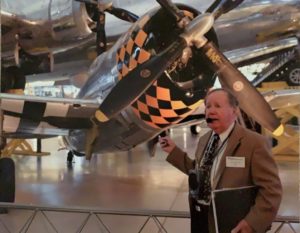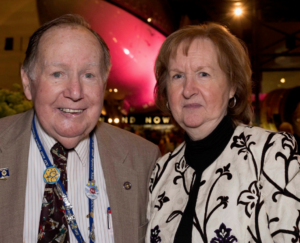The Leo Weston Award for Excellence in Service to Aviation Safety
First bestowed in 2005 on Leo Weston, an influential figure in ARSA’s birth, the Weston award honors individuals who embody his commitment to the industry.
As an FAA official, Weston advocated for the creation of an organization to represent the interests of maintenance providers. Since then – across a long career of professional and personal dedication to public good – he has been a great inspiration for the association and its members. In his honor, ARSA regularly recognizes individuals who have made a lasting impact in furthering the principles of good government.
Past Recipients (Links direct to specific posts about each honoree)
Jerry Crowley (2025)
David Latimer (2022)
Thomas Mickler (2021)
Calvin Scovel, III (2020)
Howard Whyte & Werner Luehmann (2019)
Jennifer Weinbrecht (2018)
Peggy Gilligan (2017)
Crystal Maguire (2016)
Neil Eisner (2014)
Ron Utecht (2013)
Carol Giles (2012)
Tony Janco (2011)
Julian Hall (2010)
David Cann (2008)
Al Micheals (2006)
Leo Weston (2005)
The Weston Award is celebrated as part of ARSA’s Annual Conference held in and around Washington, D.C. each March. The conference provides a venue for association members and invited guests from around the world to network and discuss issues that matter to the aviation maintenance industry. It is the perfect time to respect the history of the repair station community and honor the good works of those who support it.
For more information about the award, past recipients or ARSA’s work on behalf of the global aviation community, contact the association.
Presentation of the 2021 Award to Thomas Mickler
During ARSA’s 2021 Annual Conference, Managing Director & General Counsel Marshall Filler paused the March 11 global regulatory discussion to present the Leo Weston Award for Excellence in Service to Aviation Safety to EASA Washington Representative Thomas Micker.
Supporting Weston’s Memory
Leo Weston, a dedicated advocate of maintenance providers in the aviation industry, was also a committed docent at the Steven F. Udvar-Hazy Center, where he served as a Tuesday and Thursday docent for 15 years. Leo always enjoyed the opportunity to teach younger generations about aviation, especially through school tours. Inspired by Leo’s service to the National Air and Space Museum and his impact on the aerospace industry, his family and fellow Tuesday and Thursday docents recognized Leo at the Steven F. Udvar-Hazy Center by raising money to honor him on a plaque in association with the Pratt & Whitney Twin Wasp R-2000 engine in the museum’s engine row.
Colleagues Remember – Leo Weston
January 28, 2021
Since the announcement of Leo Weston’s passing in November of 2020, ARSA has been in touch with colleagues regarding remembrances and honors for the lifelong aviator. As a dedicated servant to the industry and instrumental figure in the association’s founding, Weston’s impact on others was deep; many who knew him have been working to carry on his work and keep his memory.
The first of those efforts has been a resounding success. Led by his fellow volunteer docents at the National Air and Space Museum’s Steven F. Udvar-Hazy Center, the Smithsonian has raised $25,000 – meeting its fundraising goal – to honor Weston with a plaque on the Pratt & Whitney Twin Wasp R-2000 engine on display in the facility’s “engine row.”
The short biography used in association with fundraising effort was drafted by ARSA to celebrate Weston’s commitment to the industry:
Leo dedicated his career to the aviation industry. He enlisted in the Army/Air Corps after high school and went on to work for Atlantic Aviation, Pan American Airlines, and the U.S. Overseas Airlines. Later in his career, Leo was offered a position at the Federal Aviation Administration (FAA). Leo’s final career post was as an Aircraft Maintenance Inspector at the FAA Headquarters in Washington, DC, where he advocated for the creation of an organization to represent the interests of maintenance providers. The Aeronautical Repair Station Association (ARSA) was founded as a result, and in recognition of Leo’s role, the Leo Weston Award for Excellence in Service to Aviation Safety was created. The award honors individuals who embody Leo’s commitment to the industry.
Weston’s fellow docents deserve grateful praise for their leadership and fundraising success. ARSA will continue to support any effort to recognize him and is working with other contacts to determine how else he can be remembered.
ARSA is also collecting memories of Weston’s life and work. If you knew or worked with him and have a story to tell, share it with the association.
To read the full announcement from November, read below.
ARSA Remembers – Leo Weston
November 30, 2020
On Nov. 28, 2020, Leo Weston, whose passion for aviation began in high school, spanned the world and lasted until his final days, passed away at home in the presence of his wife, Bernadette.
Immediately after graduating from Philadelphia’s North Catholic High School, where he learned basic aviation and engineering working on the school’s “fleet” of Piper J-3 Cubs, Weston enlisted in the U.S. Air Force. He was a mechanic and crew chief through an initial four-year enlistment as well as a recall tour in Korea.
After discharging from active duty in 1952, Weston attended Spartan School of Aeronautics in Tulsa, Oklahoma earning his Mechanic’s certificate with airframe and powerplant ratings. His civil aviation career began with Atlantic Aviation in Philadelphia before becoming a flight engineer for Pan American.
After enduring multiple furloughs, Weston began his federal civilian service with the FAA in 1964. He served in several training and management roles before transferring to the agency’s Headquarters in Washington, D.C. in 1974. His tirelessly support of the repair station community across four decades concluded with yeoman’s efforts on international harmonization before his retirement in the early 2000s.
“His dedication was matched with exceptional insight,” ARSA Executive Director Sarah MacLeod pronounced, remembering the incentive he provided in the formation of the association. “Not only did he set the foundation for the eventual international recognition of repair stations by spawning the ‘joint airworthiness regulations,’ but he also actively encouraged ARSA to become the repository of knowledge on the history, intent and plain language of aviation safety requirements. While Leo always had an opinion, it never outweighed an applicant, certificate holder, or female lawyer’s approach to showing compliance. He was as willing to learn as he was to educate; he embodied the ‘critical thinking’ sought, but so rarely found in government or industry.”
To honor Weston’s central role in the association’s formation and to recognize dedication to the public served by the international aviation maintenance community and national aviation authorities, in 2005 ARSA established the “Leo Weston Award for Excellence in Service to Aviation Safety.” The award commends individuals who embody his commitment to the industry and good government.
After his retirement Weston became a volunteer docent at the Smithsonian National Air and Space Museum’s Steven F. Udvar-Hazy Center in Chantilly, Virginia. Giving countless tours to visitors, student groups and fellow aviation enthusiasts, ensures Weston’s impact will continue well beyond any recognition bestowed publicly.
“[Leo] was the actual ‘Leo Weston Award’ for the docents at the Udvar-Hazy Center,” said fellow volunteer Joe Thomas. “When he was 90, he was giving tours to ten-year olds…[who] will have the memory of that tour for possibly 80 more years. Between Leo’s life and the students’ lives we have a period of maybe 180 years, bringing life to the phrase ‘I touch the future: I teach’. We continue to be inspired by him.”
For more information about arrangements and remembrances, click here.

Leo in his “native habitat,” in front of a Pratt & Whitney R-2800 radial engine installed in a P-47 Thunderbolt. The “Dependable Engines” logo is clearly visible. In the background is a Curtiss-Wright R-3350 on the Enola Gay. The engines in the museum are quiet, but Leo brought them to life. Photo courtesy Joe Thomas.









